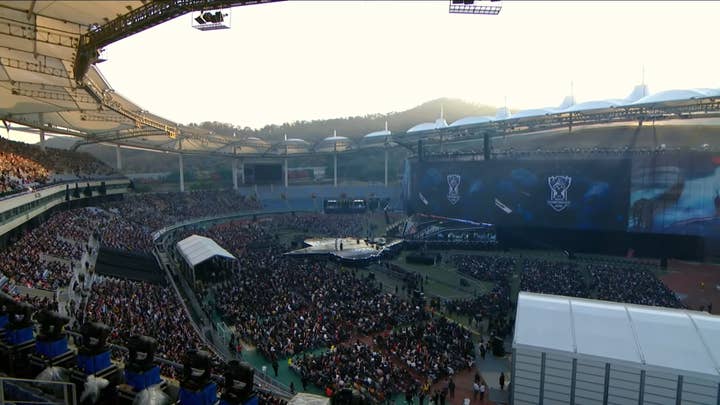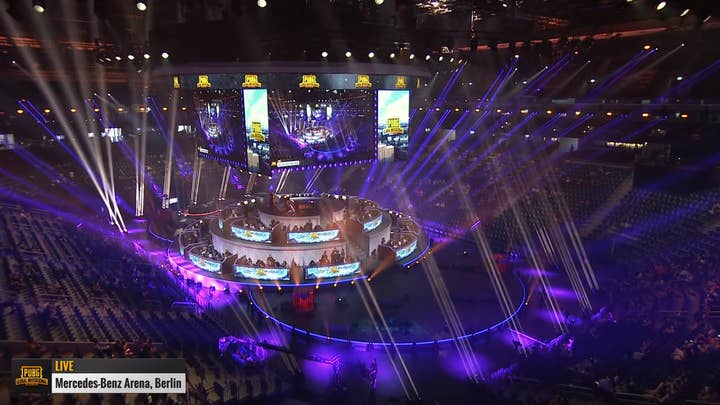The state of esports: Radical growth and inevitable failure
2018 in Review: League of Legends soars, esports are subbed by the Olympics, and PUBG flounders
A row of neatly dressed pundits dissect the day's events, spinning a narrative of heartbreak and triumph from little more than statistics.
In the background, tens of thousands of fans sprawl out into a colossal stadium, the air buzzing with infectious electricity.
Meanwhile, at home and at viewing parties around the world, millions upon millions tune in to watch the whole thing live-streamed.
Old rivalries are ratcheted up in pre-show interviews, there's a bombastic opening ceremony, infographics fill the screen with numbers, endless numbers, and the sleek operation slowly crawls towards the main event: the League of Legends World Championship Finals.
This is modern esports, a curious amalgamation of video game counter-culture and straight-laced corporate presentation. Young men and women with tattoos, technicolour hair, and names like Sjokz, CaptainFlowers, and Froskurinn belie the serious money and investment pumped into this radically expanding industry.
Professional League of Legends has come a long way since 2011, when the total championship prize pool was $100,000, and the event was streamed from a convention centre in Sweden to just over 1.6 million people. These days, the world championship sells out football stadiums, and is presented by non-endemic brands like Mastercard and StateFarm.

Of course, League of Legends is far from the only major esport, but it's certainly the biggest. According to numbers published recently by Riot Games, the world final attracted 99.6 million unique viewers, with a peak concurrent viewership of 44 million.
This year has been a barnburner for the industry. It's seen the launch of the Overwatch League, which has attracted sponsors like Toyota, eager to get their brands in front of the game's millions of viewers; Epic Games announced a $100 million prize pool for Fortnite esports; and OG won a record-breaking $11.1 million at the DOTA 2 International.
Market intelligence firm Newzoo estimates there are 143 million esports enthusiasts globally and 192 million occasional viewers. Leading esports organisations like Cloud9 are valued at $310 million, and global esports revenue is expected to reach $1 billion by 2020.
The momentum behind esports right now feels unstoppable; sporting legends like Michael Jordan, Shaquille O'Neal, and Rick Fox have staked various claims in the sector, while tech billionaire Tej Kohli recently launched a €50 million fund to support the industry in Europe.
The esports pie is wafting its delicious potential around the neighbourhood, as investors and developers alike float eagerly towards the unguarded windowsill, hoping to get a slice of their own.
Despite the sector's potential however, it's still emerging, and fraught with peril at that. While 2018 has been yet another strong year in a long line of strong years, it also saw the first two major casualties, when Blizzard announced it was ceasing esports endeavours around Heroes of the Storm, and Daybreak Games was forced to shut down the H1Z1 Pro League before completing its inaugural season.
Since then Daybreak has reportedly laid off 70 employees -- roughly 30% of its total staff. This shouldn't have came as a surprise given that the H1Z1 player base had declined by 91% between July 2017 and February 2018. Even so, studio management went ahead with the Pro League in partnership with Twin Galaxies, promising $50,000 player salaries and dozens of matches over a ten-week split.
"The esports pie is wafting its delicious potential around the neighbourhood, as investors and developers alike float eagerly towards the unguarded windowsill"
What's perhaps most striking about this situation is that Daybreak Games clearly believed esports was the golden ticket. Earlier this year, general manager Anthony Castoro said that H1Z1 leaving Early Access -- along with its new suite of features -- would be enough to attract new and returning players to the game.
But finding success in the esports sector takes more than a "build it and they will come" approach. Even if you grow an audience of millions, professional leagues are loss leaders. It was naive of everyone involved to think the H1Z1 Pro League would end in anything other than disaster given the game's ailing health.
After seven years, even the League of Legends Championship Series still doesn't turn a profit. It's likely those calculations don't include revenue generated by the inevitable spike of in-game sales around major events, but the league itself is still a money sink for Riot Games.
For the esports sector to become a true powerhouse akin to its traditional sport contemporaries, the endeavour needs to be innately profitable. That, unfortunately, is still a long way off -- though at this point it does feel like an inevitability.
That said, even gaming titans like PlayerUnknown's Battleground and Fortnite haven't taken to esports quite as gracefully as some would expect. The first official Fortnite esports tournament in August this year was a shambles. While it reached a peak viewership on Twitch of 140,500, it was plagued with technical difficulties, and fans were left disappointed by the turgid pace of play. As it turns out, the frenetic mayhem of a battle royale cools to a simmer when there's $250,000 prize pool involved.
PUBG too hasn't quite lived up to expectations. Following the PUBG Global Invitational in July, official figures claimed the tournament attracted over 100 million concurrent viewers. If that number were accurate, it would be record-breaking and logic-defying. It's likely not accurate of course, and despite PUBG sticking to the line when I challenged it, external sources also refute the number.
Hosted in the 12,000 capacity Mercedes Benz Arena, Berlin, footage from the event shows vast swathes of vacant seats, in stark contrast to the League of Legends World Championship Final which was hosted there in 2015. An event which racks up 100 million concurrent viewers should have no trouble selling out a stadium of that size, but on all three days it looked more like Sunday League than Premier League.

I reached out to several outlets to verify the number. One source from a network broadcaster said of the 100 million figure: "Nobody on my teams thought that was realistic." Meanwhile, a spokesperson from analytics group Esports Charts told me the concurrent figure was no higher than 60 million, and even that high number would be inflated by individuals watching multiple streams in order to win prizes. Numbers on Twitch, for example, were inflated 200%.
Ultimately, though, these are internal problems that can be solved internally given enough time and chance to iterate. Perhaps a more unwieldy issue is the matter of mainstream recognition, and whether it's something the industry requires in order to thrive.
Esports coverage by traditional broadcasters like the BBC and ESPN represents a huge step forward in that respect, but the real battle is over acceptance into the Olympics and other major sporting events. This dream was recently dealt a hefty one-two punch, however; in August it was revealed esports likely won't feature in the 2022 Asian Games unless it can "get together to decide one governing body", and just last week the International Olympic Committee said discussions around including esports as a medal event were "premature".
The IOC rejection comes just months after it hosted the Olympic Esports Forum in Switzerland, which saw industry stakeholders attend in order to build a "joint understanding between the esports community and the Olympic movement". With the efforts being headed up by the charismatic former NBA legend Rick Fox, things looked positive, and Riot Games CEO Nicolo Laurent optimistically suggested esports are "being more legitimised the world over".
Wasted effort though, it would seem, as the IOC's latest stance places itself rigidly against including esports in the Olympics. There is an undeniable sense of snobbery in the IOC's decision, as it claims that some esports are "not compatible with Olympic values".
The IOC also argued the esports industry was not suitable because it's commercially driven, "while on the other hand the sports movement is values-based". It's difficult not to baulk at this assertion, which overlooks the corporate interest in both the Olympic Games, and the wider sports industry from curling to Premier League football.
"These are internal problems that can be solved internally given enough time and chance to iterate"
I asked the IOC in what ways traditional sports are "values-based" and esports aren't. I also noted that both esports and traditional sports economies appear to operate in broadly the same manner -- through sponsorship, ticket sales, merchandise, peripherals, and equipment.
Football (soccer for you Americans) is one of the largest commercial interests in the world, and yet it meets the undefined "values-based" criteria, whereas esports are dismissed as being "commercially driven". The IOC response was little more than sanitised cotton wool, addressing the Olympic Movement's commitment to charitable endeavours and dodging the question in what can only be described as a wilfully evasive manner.
There is a perfectly valid argument that violent video games like Counter-Strike: Global Offensive don't belong in the Olympics. I'm not going to make that argument here, but I'm willing to acknowledge it exists.
It raises the question though, after such a successful year for the industry, of whether the esports movement should even continue to pursue this avenue. How reliant on mainstream acceptance is the success of esports? The BBC and ESPN coverage is positive, obviously, but it's like putting football on the radio after the proliferation of TV. Games and esports are forward thinking, whereas the mainstream is often more set in its ways. The same can very much be said of the Olympics.
Over the past year or so the industry has taken giant leaps in the right direction. Perhaps most important is that franchising structures are becoming the norm, granting stability for organisers, teams, broadcasters, investors, and fans -- soon the heartbreak of supporting a team all year, only for it to get relegated and turn to ash before your eyes will be a thing of the past.
Furthermore, esports are becoming more pronounced in schools and colleges; back in November, high school esports platform PlayVS received $30.5m investment, while developers like Psyonix and organisations like the British Esports Association are supporting grassroots movements.
But there is always more to be done, and the sector needs to focus on areas where it can improve. The lack of a a single governing body is problematic when it comes to dealing with government regulators and traditional sports organisations like the Olympic Council of Asia. Furthermore, there are still concerns about the profitability of esports teams as costs spiral out of control around player salaries, housing, and support staff.
Right now stability is important, and while growth is good, it creates flux.
